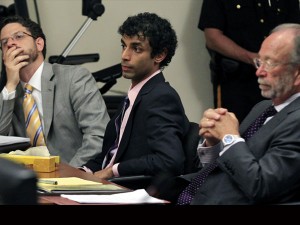
Dharun Ravi, center, sits with his attorneys Philip Nettl, left, and Steve Altman, right, as they listen during his sentencing in New Brunswick, N.J., Monday. AP
The legal saga is far from over for an Indian-born, former Rutgers University student sentenced to 30 days jail for using a webcam to spy on his roommate kissing another man. The cultural fallout could continue, too.
Dharun Ravi, 20, was sentenced Monday, two months after a jury convicted him of 15 criminal counts, including invasion of privacy and bias intimidation and seven counts dealing with covering up a crime.
The case drew national attention when the roommate, Tyler Clementi, committed suicide days after the September 2010 spying. The case touched a nerve among gay rights and anti-bullying activists as an example of the harassment and challenges that young people, and young gays and lesbians in particular, can face. Among those speaking out was President Barack Obama.
Clementi killed himself after viewing dozens of times Ravi’s tweets about what he saw. One of them said, in part: “I saw him making out with a dude. Yay.”
Judge Glenn Berman’s sentence was far less than the 10-year maximum for bias intimidation — and apparently less than prosecutors were expecting.
Within hours after the sentence was imposed, the Middlesex County prosecutor’s office announced it would appeal, arguing the sentence was too light for such serious crimes.
Ravi’s lawyers are also likely to appeal the conviction itself on several of the counts. They say the jury got it wrong by convicting him at all. They have until July 5 to appeal.
In court Monday, a judge denied Ravi’s motion to overturn the conviction and either dismiss the charges entirely or grant a new trial.
There have been clues in court filings and arguments to some issues might be appealed.
Ravi’s lawyer, Steven Altman, raised a significant one in court Monday when he said Ravi did not get a fair trial, in part because of a ruling the judge made last year denying Ravi and his lawyers access to some documents found on Clementi’s computer.
Berman, who reviewed them, said that they were not pertinent to the case.
Altman continues to take issue. He says that although the judge made clear that Ravi was not charged with Clementi’s death, his suicide loomed over the case, making Clementi’s state of mind important.
The documents may have shed light on that, he said. “Only your honor knows what was in it,” Altman told the judge.
The story of Clementi and Ravi could resonate outside of court, too.
Clementi’s parents have launched a foundation in their son’s honor to address issues including online civility, bullying and suicide.
Ravi’s supporters are calling for lawmakers to change to the state’s statute on bias intimidation so someone in Ravi’s position in the future would not be convicted of what is widely called a hate crime.
They have also sent a petition to Gov. Chris Christie requesting a pardon for Ravi.
With so much in flux, even the next step in in question. The judge told Ravi to report to jail on May 31. But the appeals could push back that reporting date.
In an interview with the The Star-Ledger newspaper, Ravi said he did not apologize for his actions largely because it would have been seen as insincere. He said anything he would say “would sound rehearsed and empty.”
“When politicians give public apologies, to me, it always sounds so insincere and false,” Ravi said in the interview, which was conducted before Monday’s sentencing but published after it. “No matter what I say, people will take it that way.”
Ravi did not address the judge Monday, and the judge criticized his lack of apology. Clementi’s brother James said hearing an apology this late from Ravi would not be meaningful to him.